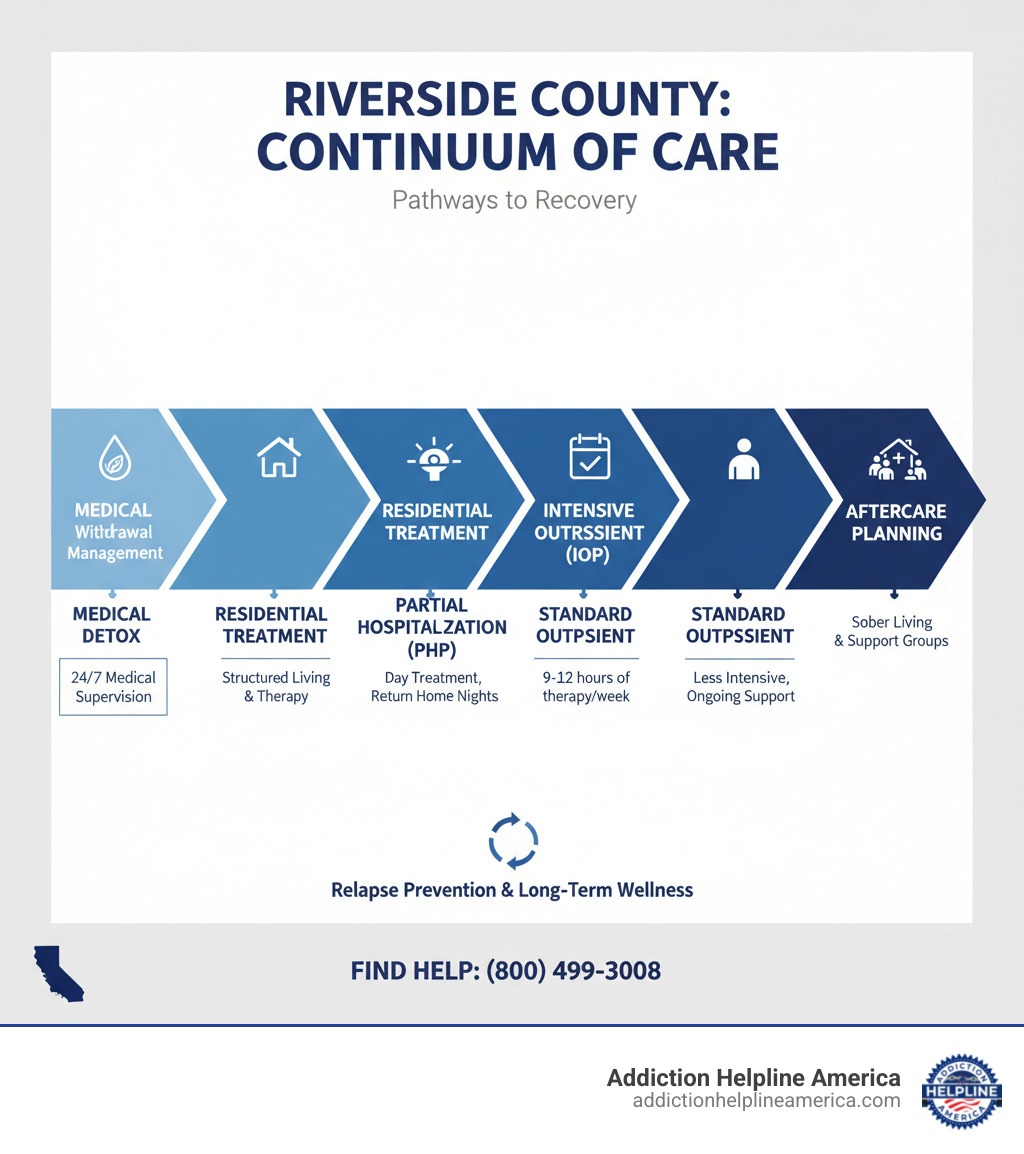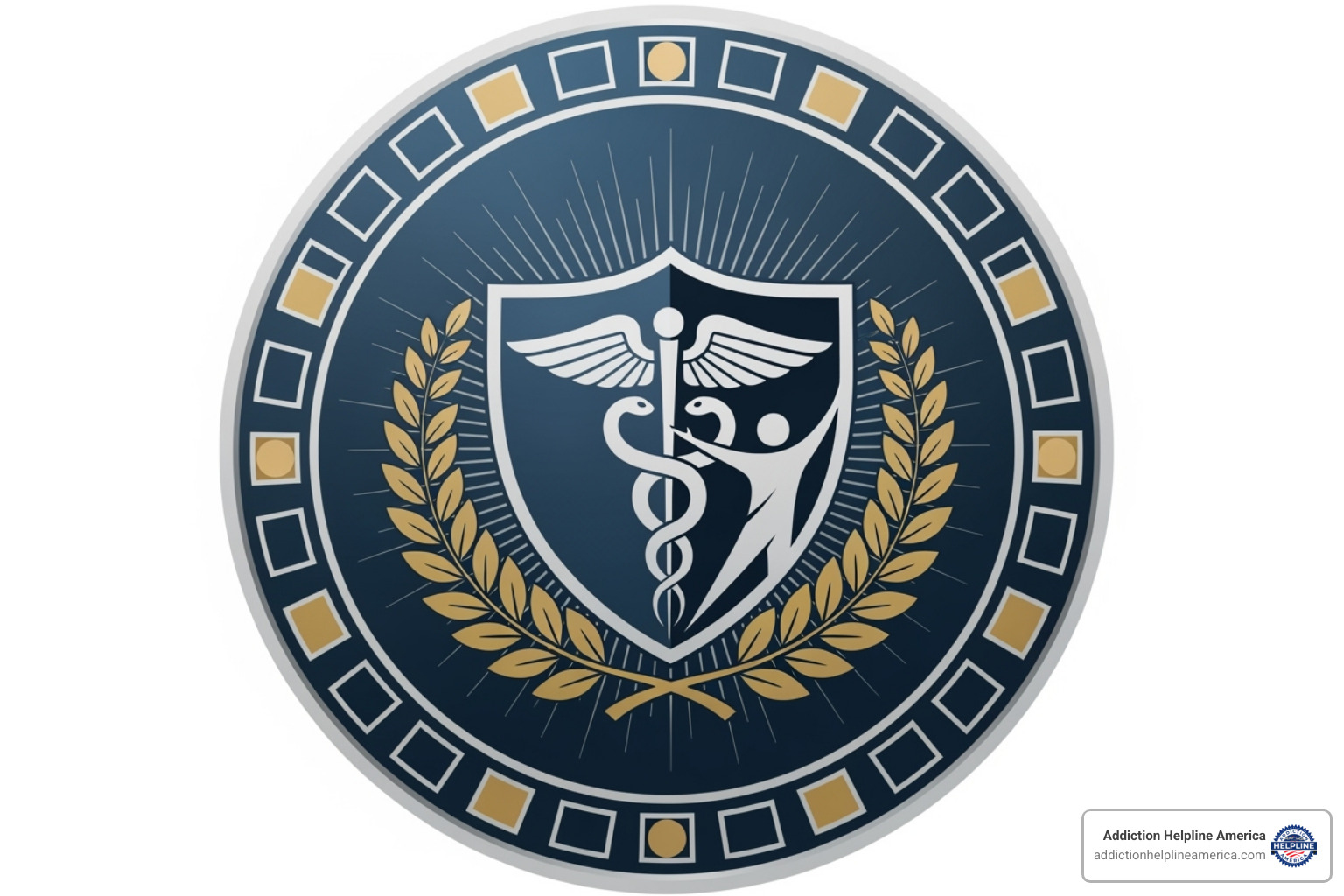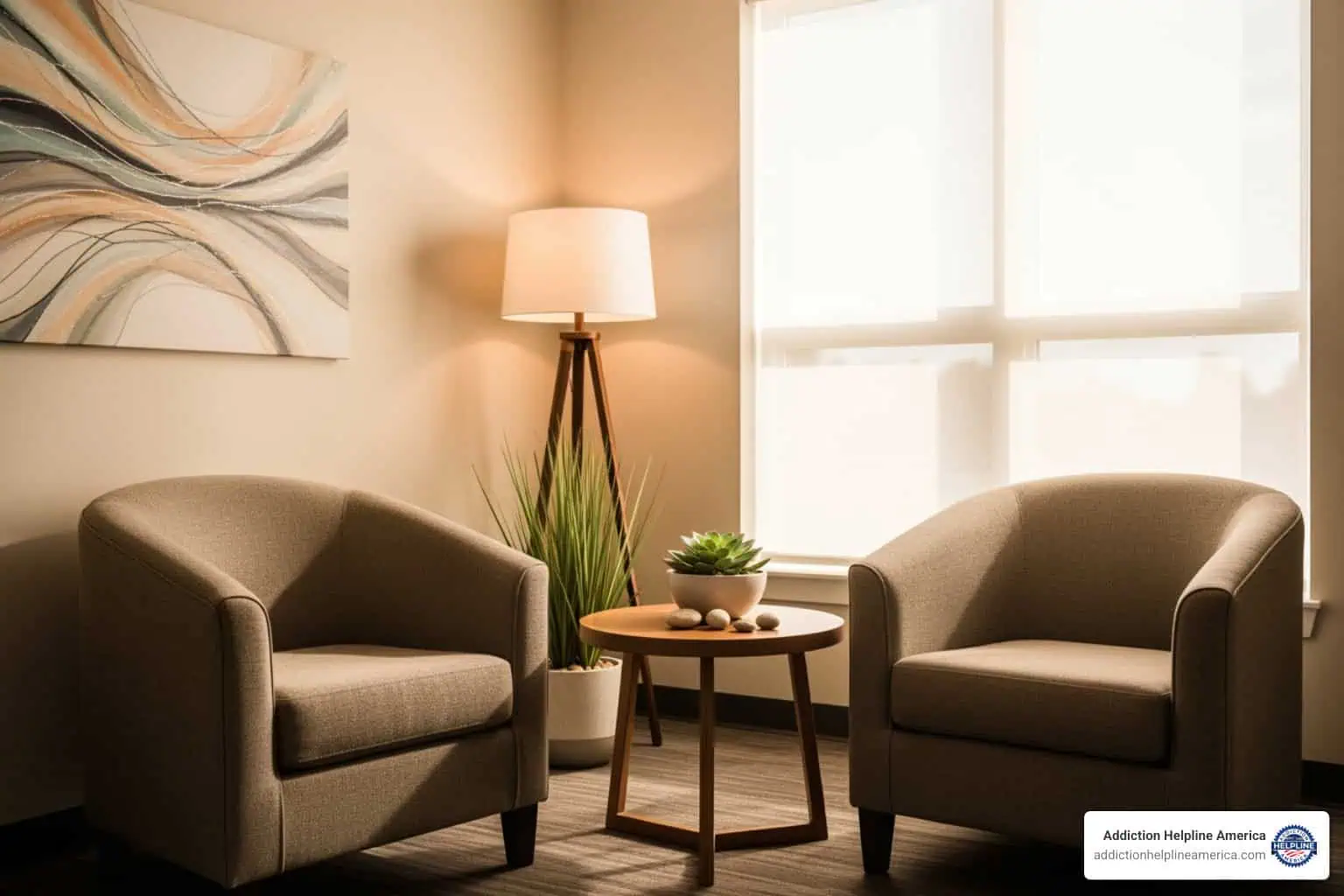
The Path to Recovery: Why Riverside County Offers Hope Amid Crisis
Drug rehab in riverside county is more critical than ever, as the region faces an unprecedented addiction crisis. The number of fentanyl-related deaths has skyrocketed by 800% in the last five years, with officials expecting over 500 deaths this year alone from fentanyl poisoning. Yet within this devastating reality lies hope – Riverside County offers a comprehensive network of treatment options designed to help individuals and families find their way back to health and sobriety.
Quick Answer: Finding Drug Rehab in Riverside County
- 69 treatment facilities within 25 miles of major cities like Moreno Valley
- Free assessments available by calling (800) 499-3008
- Multiple levels of care: Detox, residential, outpatient, and aftercare
- Insurance accepted: Most facilities accept private insurance, Medi-Cal, Medicare, and military insurance
- Specialized programs: Available for women, veterans, adolescents, and Spanish-speaking individuals
- Cost options: Free and sliding-scale programs for those without insurance
Recovery is possible, regardless of how hopeless your situation may feel right now. The research shows that with proper treatment and support, people can and do recover from even the most severe addictions.
As Addiction Helpline America, we’ve dedicated our mission to connecting individuals and families with the right treatment resources in their area, including comprehensive drug rehab in riverside county options. Our team of addiction specialists understands the unique challenges facing Riverside County residents and works around the clock to provide personalized guidance for lasting recovery.
Understanding Your Treatment Options: From Detox to Aftercare
Finding the right drug rehab in Riverside County can feel overwhelming. Think of it like choosing a path up a mountain – there are different routes depending on your needs. The good news? You don’t have to figure it out alone.
Recovery isn’t a one-size-fits-all journey. Understanding the different levels of care will help you or your loved one find the right starting point.
Levels of Care Explained
Recovery typically follows a continuum of care, with each step providing different levels of support.
Medical detox and withdrawal management is often the crucial first step. Stopping substance use can be dangerous, so medical detox provides 24/7 monitoring by doctors and nurses. Facilities like Hemet Valley Recovery Center use medications to manage withdrawal symptoms safely. You can start this process with an assessment by calling (800) 499-3008 or visiting a County Clinic.
Inpatient or residential treatment provides a live-in, structured environment focused entirely on healing. Facilities like 10 Acre Ranch, Everlast Recovery Center, MFI Recovery Center, and ABC Recovery Center offer a space away from triggers to rebuild your foundation.
Partial hospitalization programs (PHP) offer intensive daily therapy for several hours, but you return home each evening. It provides strong support while allowing for some independence.
Intensive outpatient programs (IOP) are more flexible, often involving a few therapy sessions per week. Facilities like MFI Recovery Center and ABC Recovery Center offer programs that fit around work or family schedules.
Standard outpatient treatment is the most flexible option, with therapy sessions once or twice a week while you live at home. It’s ideal for those with strong support systems or as a step-down from higher levels of care.
Aftercare planning is crucial for long-term success and includes relapse prevention and ongoing support. Sober living homes, offered by centers like MFI Recovery Center and ABC Recovery Center, provide a supportive, drug-free environment to transition back to independent living.
Therapeutic Services and Modalities
Effective treatment addresses the issues underlying substance use.
Dual diagnosis treatment is for co-occurring disorders, where addiction and a mental health condition like depression or anxiety exist together. Quality centers like Everlast Recovery Center, MFI Recovery Center, Sunrise Recovery Ranch, and Hemet Valley Recovery Center treat both conditions simultaneously, as they are often interconnected.
The therapeutic approaches used blend evidence-based methods with compassionate care. Cognitive Behavioral Therapy (CBT) helps change negative thought patterns, while Dialectical Behavior Therapy (DBT) teaches skills for managing stress. Trauma-informed care addresses past hurts that may contribute to substance use.
Family therapy recognizes that addiction impacts everyone. These sessions help repair relationships, improve communication, and build a strong support network for long-term recovery.
Many centers accept holistic approaches alongside traditional therapy. Everlast Recovery Center and 10 Acre Ranch integrate methods like yoga, mindfulness, and art therapy to support overall well-being and teach healthy coping mechanisms.
12-Step programs like Alcoholics Anonymous and Narcotics Anonymous offer invaluable peer support from others with shared experiences. You can find local AA meetings at aa.org/pages/en_US/find-local-aa.
Medication-Assisted Treatment (MAT) combines FDA-approved medications with counseling. For opioid addiction, medications like methadone or buprenorphine reduce cravings and withdrawal symptoms. Riverside University Health System Behavioral Health and MFI Recovery Center offer MAT services monitored by physicians.
Specialized Programs for Diverse Needs
The best drug rehab in Riverside County programs recognize that recovery looks different for everyone.
Women-specific programs create safe spaces to address unique issues. The MOMS Perinatal Program at Riverside University Health System Behavioral Health serves pregnant and parenting women, offering priority placement and transportation help. MFI Recovery Center also provides specialized care for women.
Adolescent services from providers like MFI Recovery Center and Riverside University Health System Behavioral Health offer age-appropriate treatment and prevention programs for teens.
Veterans deserve specialized care that addresses challenges like PTSD. The U.S. Department of Veterans Affairs is a key resource for substance abuse treatment for those who served.
Culturally sensitive programs ensure treatment respects your background. For example, Riverside University Health System Behavioral Health has an intensive outpatient program conducted entirely in Spanish.
For those in the legal system, offender drug court programs in Riverside County offer intensive outpatient treatment as an alternative to incarceration for non-violent offenders.
What matters is finding the right level of care for where you are right now. Riverside County has options that can meet you where you are and help you move forward.
Paying for Rehab: Costs, Insurance, and Affordable Options
The financial aspect of seeking help can feel overwhelming, but money shouldn’t stand between you and recovery. There are many pathways to making drug rehab in Riverside County accessible and affordable.
Most treatment is covered by insurance, and even if you don’t have coverage, options are available.
How to Verify Your Insurance for Treatment
Thanks to legislation like the Affordable Care Act, addiction treatment is an essential health benefit. This makes recovery more accessible.
The easiest way to verify your benefits is to call an admissions specialist at a treatment center. Teams at facilities like Everlast Recovery Center and 10 Acre Ranch can check your benefits quickly and confidentially, often through an online form. They will explain your coverage, including deductibles, co-pays, and any pre-authorization needs, to maximize your benefits and minimize out-of-pocket costs.
Many facilities in Riverside County work with various payment options, including private health insurance, Medi-Cal, Medicare, and Tricare for military families.
Affordable Drug Rehab in Riverside County
Everyone deserves the opportunity for recovery, regardless of their financial situation. Riverside County offers numerous affordable pathways to treatment.
Insurance is the most common way to pay for treatment. Many facilities accept private insurance. For those with Medi-Cal, free drug and alcohol rehab programs are available; start by calling (800) 499-3008 for an assessment. Non-profit organizations like MFI Recovery Center, sliding scale fees based on income, and payment plans are other ways to make treatment affordable.
What if I Don’t Have Insurance?
Not having insurance doesn’t mean you’re out of options. Don’t let a lack of coverage keep you from getting the help you need.
- Private Pay: Many facilities offer competitive cash rates and are willing to arrange payment plans.
- Healthcare Financing: Third-party medical loans can spread the cost of treatment over time.
- Grants and Scholarships: Some non-profit centers offer financial aid to help cover treatment costs.
- Free Rehabs: Government-funded programs are available for individuals with limited income. You can start by calling (800) 499-3008 or visiting a County Clinic for a free assessment.
The bottom line is this: if you’re ready to seek help, there’s a way to make it work financially. The investment in your recovery pays dividends for the rest of your life.
The Local Landscape: Finding a Quality Drug Rehab in Riverside County
When you’re searching for help, understanding what makes drug rehab in Riverside County effective is crucial. Our community faces unique challenges that require specialized, high-quality care.
The Fentanyl Epidemic’s Impact on the Community
Riverside County faces a severe addiction crisis. Fentanyl-related deaths have surged by 800% in five years, with officials expecting over 500 deaths this year alone. This synthetic opioid is often mixed with other drugs unknowingly and is 50 times stronger than heroin. The CDC provides comprehensive information on this public health threat.
Beyond opioids, the community also struggles with widespread methamphetamine and alcohol abuse, with alcohol-related deaths increasing 91% in a decade. Misuse of prescription drugs also remains a significant problem. These realities make finding quality treatment a matter of life and death.
What to Look For: Accreditation and Licensing
When seeking help, you deserve to know that a facility meets the highest standards. Accreditation and licensing are your assurance of quality and safety.
- State Licensing: All legitimate California facilities must be licensed by the State Department of Health Care Services (DHCS). You can verify any facility’s status in the DHCS database.
- Accreditation: Look for seals from CARF or the Joint Commission. These indicate a facility, like MFI Recovery Center, meets high standards for care and treatment outcomes.
- Staff Credentials: A quality team includes licensed medical doctors, certified substance use counselors, and licensed therapists who can address all aspects of recovery.
Alternative and Court-Ordered Resources
Recovery resources extend beyond traditional rehab, meeting people where they are.
- Support for veterans: Many programs adapt to address veteran-specific issues like PTSD, and the U.S. Department of Veterans Affairs is a primary resource.
- Drug court support: Riverside County operates four adult drug court programs that provide treatment as an alternative to incarceration for non-violent offenders.
- DUI program guidance: The county provides education and intervention for DUI offenders, and diversion programs like PC 1000 prioritize treatment over jail time for first-time drug offenses.
These programs recognize that people struggling with addiction need treatment and support, not judgment. The goal is always to help build a healthier, substance-free life.
Frequently Asked Questions about Riverside County Rehab
When you’re considering drug rehab in Riverside County, it’s natural to have questions. Here are the answers to some of the most common ones.
What is the first step to getting into rehab in Riverside County?
The first step is a confidential assessment with a certified substance use counselor. This conversation helps determine the best level of care for your unique situation, considering factors like substance use history and mental health. You can get an assessment by calling the toll-free number (800) 499-3008 or by walking into a County Clinic. The process is private and comes with no obligation.
Can I get treatment for both addiction and a mental health issue like depression?
Yes, absolutely. Treating addiction and mental health issues like depression or anxiety at the same time is called dual diagnosis or integrated treatment. Since these conditions often fuel each other, addressing both is crucial for lasting recovery. Most modern facilities in Riverside County, including Everlast Recovery Center, MFI Recovery Center, and Sunrise Recovery Ranch, have specialized programs and expert teams to treat co-occurring disorders simultaneously.
Are there programs specifically for pregnant or parenting women?
Yes. Specialized programs exist to support pregnant and parenting women. The MOMS Perinatal Program from Riverside University Health System Behavioral Health is a key resource, offering priority placement and transportation assistance for mothers and their children. Facilities like MFI Recovery Center also offer women-specific programs that provide a safe, supportive environment to address unique challenges related to trauma, parenting, and recovery.
Your Path to a New Beginning Starts Today
Taking the first step toward recovery is a courageous decision. While it may feel overwhelming, recovery is absolutely possible, and you don’t have to do it alone.
The network of drug rehab in Riverside County offers a full spectrum of support, from medical detox to residential programs and specialized care for dual diagnosis, women, or veterans. There is no single “right” path to recovery. Whether you need intensive treatment or flexible outpatient therapy, the right resources are available.
What matters most is that you’re considering getting help. That voice in your head telling you to research treatment options is hope speaking.
At Addiction Helpline America, our mission is to connect you with the right treatment. Our team understands the challenges facing Riverside County residents and provides free, confidential guidance to help you steer your options, from verifying insurance to finding an accredited facility.
Your story doesn’t end with addiction—it transforms through recovery. The supportive community and dedicated professionals in Riverside County are ready to help you write your next chapter.
Our helpline is 100%
free & confidential
If you or someone you care about is struggling with drug or alcohol addiction, we can help you explore your recovery options. Don’t face this challenge alone—seek support from us.
Programs
Resources
Will my insurance
cover addiction
treatment?
We're ready to help
Find the best
drug or alcohol treatment
center
Are you or a loved one struggling with addiction? Call today to speak to a treatment expert.






